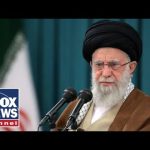In recent conversations about international relations, Iran has found itself in a precarious position. With the remnants of its once formidable alliances crumbling, the question arises: is Iran ready to engage in meaningful negotiations? Analysts suggest that much of the answer lies in the hands of the Iranian leadership, particularly the Ayatollah. Interestingly, recent events following a declared victory have placed Iran under a spotlight, especially as remarks about dropping sanctions circulate through political corridors.
A seasoned political analyst noted that Iran’s diplomatic relationships have been significantly diminished. The nation’s so-called friends, Russia and China, appear to have distanced themselves, leaving Iran isolated on the global stage. Additionally, its proxies—groups like Hamas, the Houthis, and Hezbollah—are also seemingly absent from the scene. With this isolation, Iran’s ability to influence its regional neighbors has significantly weakened. The mere notion of restarting its nuclear program now hangs in the balance. If so, the response from the international community, particularly the United States, will be firm, as past actions have illustrated.
Even with satellite images providing clear insights into Iran’s nuclear facilities, there remains an air of uncertainty. However, the consensus is that U.S. intelligence capabilities are stronger than ever. Through a combination of advanced technology and deep penetration of intelligence networks, U.S. officials can monitor developments closely. There is speculation that dissent is brewing within Iran, even among those who previously stood behind the Ayatollah’s rhetoric. If there’s ever a time for the Iranian leadership to reconsider its stance, that time is now.
While conversations zero in on Iran’s stance, the broader narrative also focuses on the Abraham Accords, which aim to establish normalization between Israel and various Arab nations. Reports suggest that countries once considered unlikely candidates may soon join these peace agreements. Analysts believe that the recent sabotage initiatives by Iran—most notably through militant groups—have backfired spectacularly. Instead of inciting conflict, these actions could catalyze a broader push for peace across the region, further sidelining Iran.
With Iran’s military, political, and financial clout drastically diminished, the incentive for other Arab nations to ally with it appears to be evaporating. Rather than fostering alliances, Iran’s aggressive strategies may end up accelerating partnerships between its adversaries. As regional dynamics continue to shift, it remains to be seen how Iran will navigate these turbulent waters. The fate of its nuclear ambitions and diplomatic overtures seems closely intertwined with its recent history of hostility. For now, the world watches, curious to see if Iran will take the hint and choose the path of constructive dialogue, or if it will remain ensnared in the web of its own making.




